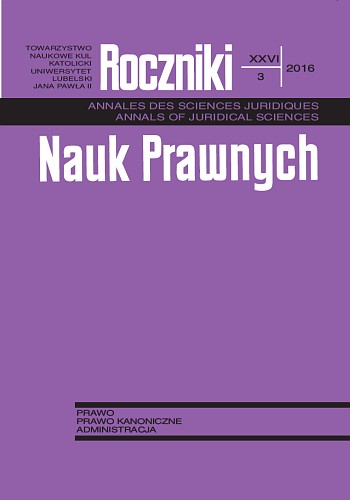El futuro de los acuerdos entre el Estado Español y la Santa Sede. Los lugares de culto y la asistencia religiosa (según los programas de los partidos políticos a las elecciones generales del 2015)
The Future of the Agreements Between Spain and Holy See. The Places of Worship and Religious Assistance (According to the Programs of Political Parties in the General Elections in 2015)
Author(s): Remigio Beneyto BerenguerSubject(s): Law, Constitution, Jurisprudence, Civil Law, Canon Law / Church Law
Published by: Towarzystwo Naukowe KUL & Katolicki Uniwersytet Lubelski Jana Pawła II
Keywords: Church; State; positive secularism; religious equality; cooperation; religious freedom; places of worship; religious service
Summary/Abstract: In the second article in the series “The future of the agreements between Spain and Holy See” R. Berenguer Beneyto, a professor of law on religion at the University CEU in Valencia, analyzes the programs of political parties, presented before the elections in December 2015 concerning the places of worship and religious service where are faithful. He discusses that negating of the existing agreements which occurs in these programs – in presented issue – is threatening the protection of places of worship, the inviolability of archives, registers and other documents of religious communities, because in some of these a full-scale attack on the organizational autonomy is assumed, and even on what is connected with sanctifying in the Church. Also it is not possible to agree with negating of the existing guarantees for the religious service in hospitals, prisons, nursing homes and other places, where are believers. The possibility of religious assistance in these places is a clear manifestation of respecting the right of religious freedom, individually or in the community. Public authorities are supposed to recognize, promote and guarantee the right of religious freedom of Catholics - ¾ of the Spanish population. Existing guarantees should not be understand as privileges, because they are a manifestation of the fundamental law. The statements that the guarantees of the religious service in such places towards those who want it are to be abolished, because the religious service can disturb the peace of unbelieving or non-practicing, is a simply manifestation of demanding the religious secular state.
Journal: Roczniki Nauk Prawnych
- Issue Year: 26/2016
- Issue No: 3
- Page Range: 7-23
- Page Count: 17
- Language: Spanish

